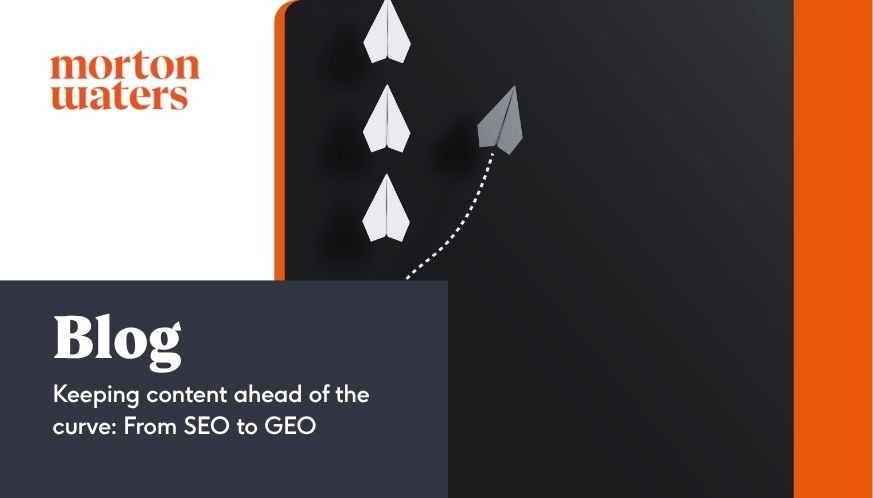Digital marketing never stands still. As new technologies reshape how people search for information, it is vital to stay up to speed. At Morton Waters, we keep a close eye on developments that affect how brands are found online.
Search is changing, and with it, the way we write, structure and amplify content. While search engine optimisation (SEO) still matters, there is a broader picture to consider – one that involves large language models and content that earns its place within AI-powered results.
In this article, our Account Director Eleanor Matthews explores the rise of AI-led search and what it means for businesses.
What Is GEO (Generative Engine Optimisation)?
GEO refers to how content is discovered and surfaced through AI-powered platforms like ChatGPT, Google’s AI Overviews, and other conversational search tools. These models do not simply rank pages and display ten blue links. Instead, they draw on a wide range of data to deliver answers, suggestions and summaries within a single response.
Why GEO matters for your business
Visibility increasingly depends on how well content is represented within AI tools. GEO is about ensuring your content is well placed to be cited, included, or drawn upon in these responses. This shift marks the biggest change in how online content is surfaced in over two decades.
For businesses, this means taking the long view. It is no longer just about appearing on the first page of Google. It is about making sure your brand and your content are recognised and used as trusted sources by the systems that shape how people receive information.
Write for questions, not just rankings
Effective website content now means answering the questions your customers are likely to be using search tools to ask. In practice, that means going beyond simply using keywords and instead offering helpful, well-structured content that answers queries directly.
To increase discoverability through both SEO and GEO on content pieces:
- Use headings to segment content clearly
- Add concise summaries and bullet points
- Include FAQ sections
- Write in a natural, question-based format
Much of this is already familiar to those who follow SEO best practice. GEO simply adds a layer of consideration about how content may be interpreted, reused, or cited in future search experiences.
Frontier content and early insight
Publishing content early on emerging topics gives you a clear GEO advantage. Frontier content – thoughtful, original takes on new developments – is more likely to be used by AI systems as a foundational source.
To benefit:
- Monitor trends in your industry
- Publish timely guides and explainers on relevant developments
- Take strong, expert-informed thought-leadership positions
- Be first to share insights – before competitors
But still prioritise quality over speed – AI rewards depth of expertise. Well-researched, forward-looking content gives your brand long-term credibility and a stronger presence in AI-generated results.
Brand visibility is broader than page rankings
One of the biggest mindset shifts involved in GEO is recognising that visibility now depends on more than page ranking. AI models are trained on huge datasets, including mentions of brands across news articles, blogs, forums and reviews.
In this context, public relations becomes a vital part of your content strategy. Traditional media coverage, expert commentary, and keyword-aware press releases all feed into how your brand is understood and referenced in these systems. Brand recognition is increasingly shaped by consistent, credible presence across a wide range of sources.
Where SEO focuses on your own website, GEO asks a wider question: how well are you represented across the internet as a whole?
Use AI to see how you’re perceived
A simple but practical tip is to ask AI tools what they know about your business. Try prompting a tool like ChatGPT with questions that relate to your service offering:
- What does it say about your services?
- Which brands are mentioned?
- What kind of content appears?
Doing this helps spot any gaps, misunderstandings, or opportunities. It is a useful exercise for content teams, helping to shape future updates or identify areas where your visibility could be stronger.
The SEO foundation still matters
Despite the pace of change, much of what makes content effective remains the same. Good SEO practice continues to play a vital role. Clear page structures, thoughtful internal linking, metadata, image alt text, and accessible design are all essential. Many well-maintained websites already have these elements in place, which means they are well positioned to benefit from the shift towards AI-led discovery.
At the same time, the importance of content quality has grown. One framework that remains as relevant as ever is E-A-T: Expertise, Authoritativeness, and Trustworthiness. These principles are central to how Google, and increasingly large language models, assess the reliability of a source.
As GEO becomes part of the mix, the fundamentals of good content remain constant. The focus now is on building on that foundation – creating material that meets both human expectations and machine understanding, and ensuring your brand appears consistently across the wider online landscape. It is worth reviewing how well your current content reflects E-A-T principles and updating where necessary to maintain visibility in both search results and AI-generated answers.
Contact the experts
We understand how to create content that performs well in search, earns visibility in AI responses, and speaks clearly to the people who matter to your business. If you’re reviewing your approach or planning your next steps, we’d be happy to help. Our team is here to help; get in touch.
